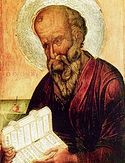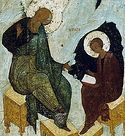

| Previous day | Next day |
| Old Style
May 8
|
Friday |
New Style
May 21
|
|
3rd Week after Pascha.
Tone 2.
Fast Day. |
Fish, wine and oil allowed.
|
![]() Apostle and Evangelist John the Theologian (98-117).
Apostle and Evangelist John the Theologian (98-117). ![]() St. Arsenius the Great, of Scetis (449-450).
St. Arsenius the Great, of Scetis (449-450).
St. Pimen the Faster, of the Far Caves in Kiev (12th c.). St. Arsenius the Lover of Labor, of the Kiev Caves (14th c.) Sts. Zosima and Adrian, of Volokolamsk, founders of the Sestrinsk Monastery (15th c.-16th c). Translation of the relics of St. Arsenius of Novgorod, fool-for-Christ (1785).
St. Hierax of Egypt (5th c.). St. Iduberga, foundress of Nivelles (Neth.) (652). Sts. Wiro (710) and Plechelm (730), missionary bishops, and Otger, deacon (8th c.), in the Maas Valley at Limburg (Neth.). St. Macarius of Ghent, archbishop (1012). St. Emilia (375), mother of Sts. Macrina, Basil the Great, Naucratius, Peter of Sebaste, and Gregory of Nyssa. Commemoration of the healing of the blinded Stephen by the Icon of the Most Holy Theotokos of Cassiopia (1530).
Repose of Hieroschemamonk Michael of Valaam, confessor for the Orthodox Calendar (1934).
Thoughts for Each Day of the Year
According to the Daily Church Readings from the Word of God
By St. Theophan the Recluse

Friday. [Acts 8:40–9:19; John 6:48–54]
Saint Paul defended the Old Testament routines so zealously at first, because he was sincerely certain that it was the unalterable will of God that these routines remain unchanged. He was not zealous because it was his fathers’ faith, but because he was zealous in bringing service to God. In this lay the spirit of his life—to devote himself to God and direct all his energy toward things pleasing to Him. Thus, in order to bring about his conversion, or to make him stand for the realm of New Testament things rather than the Old Testament, it was sufficient to tangibly show him that God no longer wants the Old Testament but rather the New, and that He has removed all of His good will from the former and given it to the latter. The Lord’s appearance on the road accomplished this in him. There it became clear to him that he was not directing his zeal where he ought, that he was not pleasing God by acting as he did, but was going contrary to His will. This vision of the state of affairs, with the help of God’s grace, immediately changed his strivings, and he cried out: Lord, what wilt Thou have me to do? (Acts 9:6). And from that moment on he directed all of his zeal toward what was shown to him, and he did not forget this event for his whole life, but thankfully remembering it, stirred up his zeal with it—not sparing anything to work for his Lord and Saviour. This is how all people act who have sincerely turned to the Lord.
Articles
 The Inexhaustible Ocean of Christ’s Divine LoveHieromartyr Thaddeus (Uspensky)Where the spirit of love blows, it is easy and free to breathe. |
 Venerable Arsenius the GreatSaint Arsenius the Great was born in the year 354 at Rome into a pious Christian family, which provided him a fine education and upbringing. |
 Venerable Pimen the Ascetic of the Kiev Far CavesSaint Pimen, Faster of the Caves, won fame by his exploit of fasting. |
 Venerable Arsenius the Lover-of-Labor of the Kiev Far CavesSaint Arsenius the Lover of Labor lived during the fourteenth century. |





